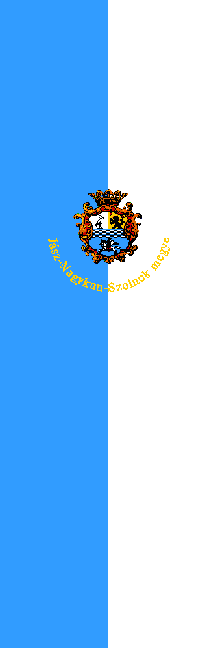
by Zeljko Heimer

Last modified: 2004-12-30 by dov gutterman
Keywords: hungary | jasz-nagykun-szolnok | nagykun | szolnok | tisza | zagyva | koros |
Links: FOTW homepage |
search |
disclaimer and copyright |
write us |
mirrors
See also:
Municipalities (78 settlements, including 16 towns and 1 city):
City (not part of the county):
Towns:
Other municipalities in FOTW:

by István Molnár, 27 August 2001
Flying flag at the Conquest Statue, Opusztaszer NHP. Ratio:
3:1. The width of the Coat of Arms is the 1/3 of the width of the
flag. The Coat of Arms is on the 1/3 of the flag's height. The
inscription is gold.
István Molnár, 27 August 2001
jns.gif)
from <www.externet.hu>,
located by Pascal Vagnat, 29 December 1998
The Coat of Arms (bigger image) as well as an explanation (in
Hungarian) of the Coat of Arms of Ja'sz-Nagykun-Szolnok county in
Hungary at <www.externet.hu>.
Pascal Vagnat, 29 December 1998
This is the description:
Coat of Arms of Jasz-Nagykun-Szolnok brought back in 1991, with
"renovations" to the Coat of Arms of 1878. The Chief is
divided into two fields, the sinister side having a stork
symbolizing Outer-Szolnok, the dexter side having a dark brown
lion, above him a scarlet moon and star, symbolizing the
Nagykunsag the bottom part of the Coat of Arms is a soldier
riding a white horse, in his left hand a Lehel-kurt (a Hungarian
legend taking place at the battle of Augsburg in 955 AD), in his
left hand a shield the three white bands symbolize JNSz's three
main rivers, the Tisza (Theiss), the Zagyva, and the Koros.
Georges Kovari III, 29 December 1998